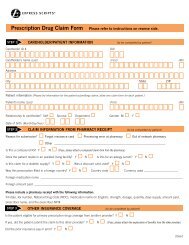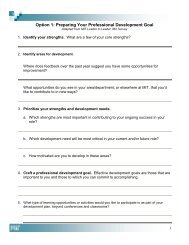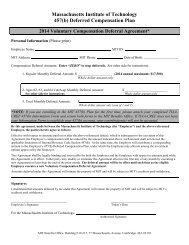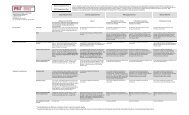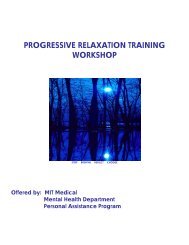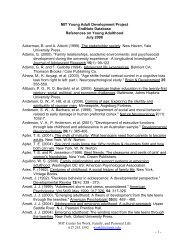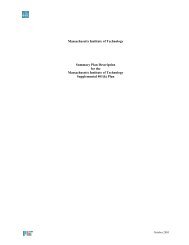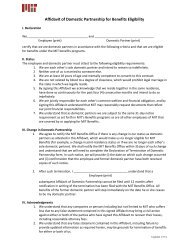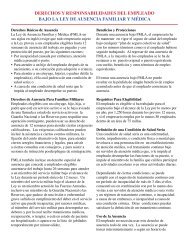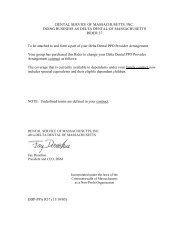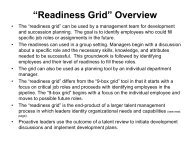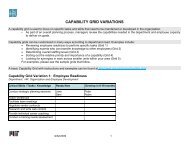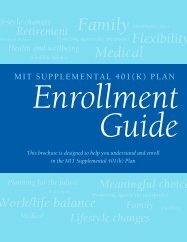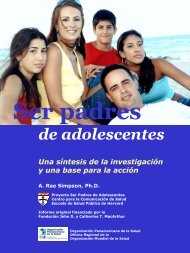Helping parents in developing countries improve adolescents' health
Helping parents in developing countries improve adolescents' health
Helping parents in developing countries improve adolescents' health
You also want an ePaper? Increase the reach of your titles
YUMPU automatically turns print PDFs into web optimized ePapers that Google loves.
4Modell<strong>in</strong>g of appropriate behaviour<br />
Description: In theories of behaviour change and social epidemiology, there is much<br />
discussion on the concept of “social norms” – a set of idealized attitudes and behaviours<br />
that are considered acceptable <strong>in</strong> a culture or society. For adolescents, there are various<br />
sets of norms that <strong>in</strong>fluence their actions, depend<strong>in</strong>g on the social doma<strong>in</strong>. For example,<br />
there may be one set of norms at school, another related to religious affiliations, and<br />
another set among friends. Most importantly, there are norms that exist at home. As<br />
<strong>in</strong>dividuals with enormous <strong>in</strong>fluence <strong>in</strong> all aspects of development, <strong>parents</strong> establish these<br />
norms with<strong>in</strong> the household by their own behaviour and attitudes as well as <strong>in</strong>terpret<strong>in</strong>g<br />
the norms of the larger society.<br />
From <strong>in</strong>fancy, children identify with their <strong>parents</strong>, particularly the same sex parent. They<br />
come to share <strong>parents</strong>’ perceptions of the world, absorb their values and try to emulate<br />
their behaviours. This cont<strong>in</strong>ues <strong>in</strong>to adolescence, and yet <strong>parents</strong> frequently may not<br />
realize that what they say, how they react and, most importantly, what they do, have an<br />
<strong>in</strong>fluence on their adolescent. Adolescents consciously or subconsciously follow or adapt<br />
themselves to the behaviour and attitudes the parent has established with<strong>in</strong> the home.<br />
Parents become role models – their behaviours and attitudes provid<strong>in</strong>g examples of how to<br />
behave <strong>in</strong> relation to many areas of daily life, <strong>in</strong>clud<strong>in</strong>g <strong>health</strong>.<br />
Evidence: To date, most of the research on role modell<strong>in</strong>g has been done <strong>in</strong> <strong>in</strong>dustrialized<br />
country contexts. Research from the United States demonstrates unequivocally that hav<strong>in</strong>g<br />
<strong>parents</strong> who make <strong>health</strong>y choices themselves is l<strong>in</strong>ked to better skills and attitudes<br />
around academic achievement, employment, <strong>health</strong> habits, relationships, communication,<br />
cop<strong>in</strong>g and conflict resolution. 34, 35, 36, 37 Parents’ attitudes have been demonstrated<br />
to <strong>in</strong>fluence their adolescents’ attitudes towards the same subjects. The evidence is<br />
particularly strong to <strong>in</strong>dicate that, when it comes to major issues <strong>in</strong>volv<strong>in</strong>g morality,<br />
34, 38<br />
adolescents are likely to hold op<strong>in</strong>ions and attitudes similar to their <strong>parents</strong>.<br />
Much of the research relevant to <strong>parents</strong>’ attitudes and behaviours <strong>in</strong>fluenc<strong>in</strong>g subsequent<br />
behaviour by adolescents focuses on substance use. A high correlation has been<br />
repeatedly documented between substance-abus<strong>in</strong>g <strong>parents</strong> and adolescent substance<br />
use. It has been demonstrated that adolescents are <strong>in</strong>creas<strong>in</strong>gly more likely to use alcohol<br />
as the number of people <strong>in</strong> their lives, <strong>in</strong>clud<strong>in</strong>g their <strong>parents</strong>, who do <strong>in</strong>creases. Further,<br />
the research has also provided evidence that non-us<strong>in</strong>g <strong>parents</strong> mediated the effect of peer<br />
16 <strong>Help<strong>in</strong>g</strong> <strong>parents</strong> <strong>in</strong> develop<strong>in</strong>g <strong>countries</strong> <strong>improve</strong> adolescents’ <strong>health</strong>



